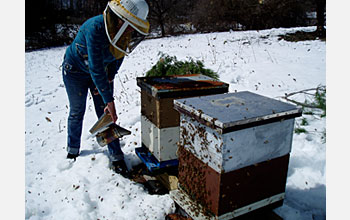|

Press Release 08-062
National Science Foundation Announces Graduate Research Fellows for 2008

Awards are made to 913 graduate students in STEM disciplines
April 15, 2008
The National Science Foundation (NSF) has announced this year's Graduate Research Fellows (GRF), who represent a diverse group of scientific disciplines and regions of the country. They are also a diverse group of individuals. Among the 913 awardees, 490 are women, 133 are from underrepresented minority groups, and 31 are people with disabilities. The GRF program, the oldest of NSF's programs, makes awards directly to graduate students rather than to universities. As such, the awards are "portable." Students receive three years of funding at the institution they choose--up to $121,500--for research-focused master's and doctorate degrees in science, technology, engineering and mathematics (STEM) fields. (The students receive a stipend of $30,000 a year, plus $10,500 a year as a cost of education allowance.) Students are eligible to receive supplements for travel and supercomputing. NSF Fellows are expected to become experts who can contribute significantly to research, teaching, and innovations in science and engineering. Since 1952, NSF has funded 43,000 GRFs out of more than 500,000 applicants. Twenty of them have gone on to become Nobel laureates, including David Politzer and Frank Wilczek (Physics, 2004), and Eric Maskin (Economics, 2007). Among GRFs who have found success in business, Google co-founder Sergey Brin is probably the most well-known. As a group, GRFs have a high rate of doctorate degree completion, with more than 70 percent of students completing their doctorates within 11 years. A complete list of those offered this fellowship for 2008 is available at https://www.fastlane.nsf.gov/grfp/AwardeeList.do?method=loadAwardeeList. For general information about the program, go to http://www.nsfgradfellows.org/.
-NSF-

Media Contacts
Maria C. Zacharias, NSF (703) 292-8070 mzachari@nsf.gov
Program Contacts
William J. Hahn, NSF (703) 292-8545 whahn@nsf.gov

The National Science Foundation (NSF) is an independent federal agency that
supports fundamental research and education across all fields of science and
engineering, with an annual budget of $6.06 billion. NSF funds reach all 50
states through grants to over 1,900 universities and institutions. Each year,
NSF receives about 45,000 competitive requests for funding, and makes over
11,500 new funding awards. NSF also awards over $400 million in
professional and service contracts yearly.
 Get News Updates by Email Get News Updates by Email
Useful NSF Web Sites:
NSF Home Page: http://www.nsf.gov
NSF News: http://www.nsf.gov/news/
For the News Media: http://www.nsf.gov/news/newsroom.jsp
Science and Engineering Statistics: http://www.nsf.gov/statistics/
Awards Searches: http://www.nsf.gov/awardsearch/
| 

